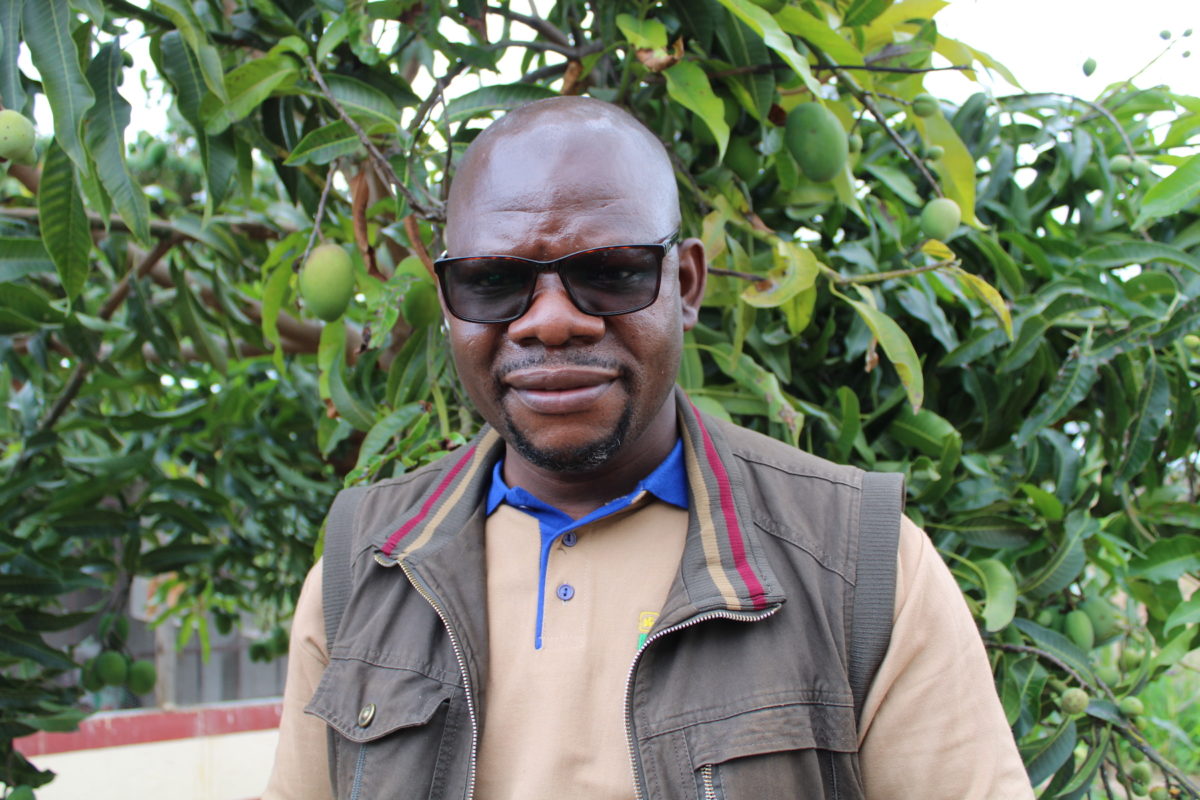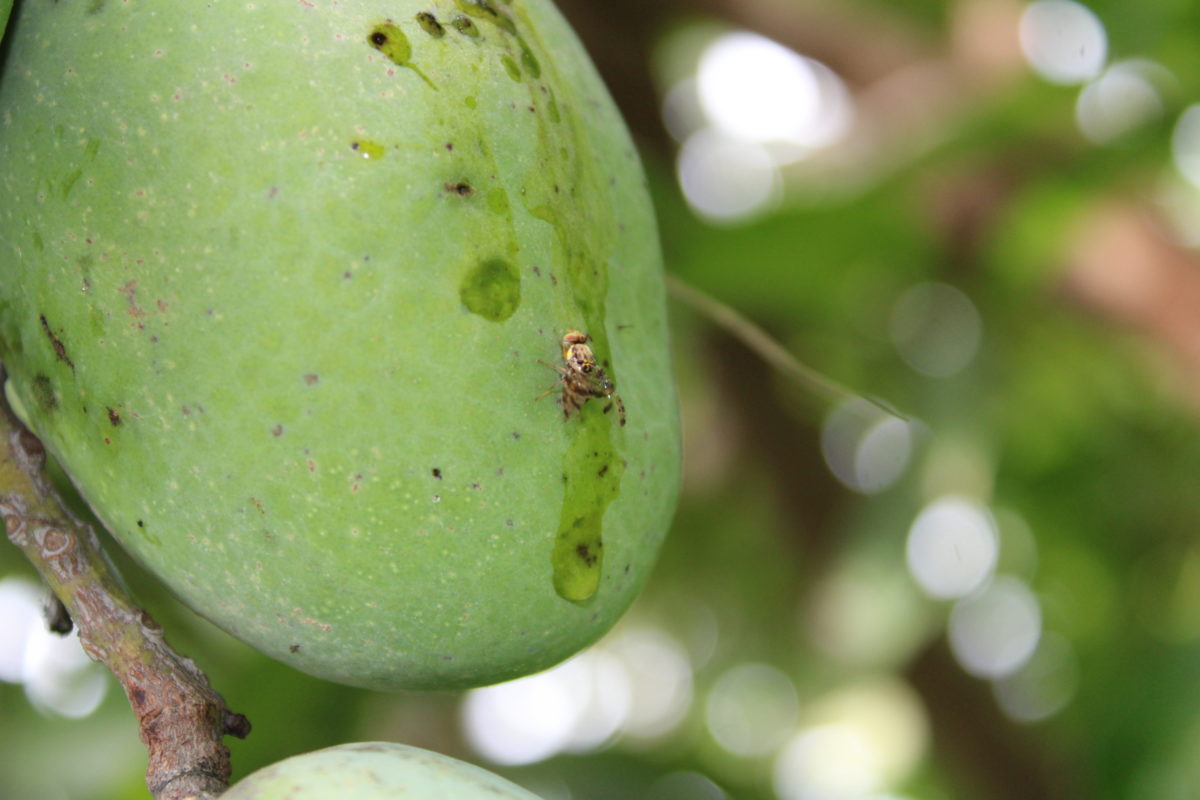Climate change is encouraging the proliferation of new crop insect pests that pose a serious food and financial threat to African farmers.
From tree-drilling beetles to leaf-munching worms and fruit-puncturing flies, invasive pests are destroying food and inflicting financial ruin on farmers in Africa. Mango farmers in Southern Africa have been particularly hard hit as they watch the fruits of their labor laid to waste by invasive insects.
“Climate change facilitates the spread of invasive pests mostly due to the creation of new habitats and weather conditions suitable for insect pests with invasive characteristics,” explained Shepard Ndlela, an entomologist with the International Centre of Insect Physiology and Ecology (ICIPE), based in Nairobi, Kenya.
Ndlela is also coordinator of the African Fruit Fly Program, a multi-stakeholder initiative that aims to eradicate invasive Oriental fruit flies, Bactrocera dorsalis, across the continent. The fruit fly attacks more than 40 host plants, though mango seems to be its favorite.
Food loss, economic ruin
Climate change-induced droughts and high temperatures have provided optimal conditions for pests and diseases to thrive, unleashing destruction on crops. As temperatures rise, scientists say the reproduction success of plant pests increases as they are sensitive to temperature changes.
The relationship between insect pests and their natural enemies has also changed, resulting in increases and decreases in the status of individual pest species, according to research by the United Nations Food and Agriculture Organization (FAO).
Climate change is also spreading pests to new geographical regions. African farmers are now struggling with the fruit fly and fall armyworm that have long bedeviled other parts of the world. The fruit fly is a new pest first discovered in Kenya in 2003 that has already spread to more than 20 countries in Africa. The fall armyworm, a moth native to the Americas, found its way to Africa in 2016, causing huge crop losses to farmers.

Other invasive pests like the blue gum chalcid wasp, the red gum lerp psyllid and the bronze bug have destroyed eucalyptus trees, also known as gum trees, in Zimbabwe, where commercial logging companies have incurred millions of dollars in lost timber.
Financial losses due to these invasive pests are staggering. As a result of the Oriental fruit fly alone, South Africa’s Western Cape Province, a major fruit-growing region, has lost an estimated US$3.2 million annually since the insects became established in the region. Kenya has estimated a loss of US$1.9 million annually since 2003, the Mozambique government estimates losses of US$2.5 million since 2008 and Zimbabwe throws away half of the 400,000 metric tonnes of mangoes it produces annually due to pest damage. According to FAO, the fruit fly is spreading rapidly across Africa. It is now present in all countries within the Southern Africa Development Community region, where it causes losses of approximately US$2 billion annually for fruit farmers.
Exports in jeopardy
Mango is an important export crop across Africa, targeting markets in the Middle East and Europe that have tightened phytosanitary regulations for all mango exporters into the European Union to guard against the fruit fly.
In Southern Africa, mangoes are a key source of nutritious food and income. However, fruit fly infestation now seriously hampers mango production in Malawi, Mozambique, Zambia and Zimbabwe.
In Zimbabwe, specifically, mango production has a high potential to contribute to the incomes of smallholder farmers, particularly women and youth. However, the invasive fruit fly is disrupting the country’s efforts to promote sustainable agriculture production — a sector that is key to jobs, food security and income. The fruit fly is now seen as posing a serious threat to food and financial security.
IPM to the rescue
Zimbabwean farmer Pelegrina Msingwini reported that in past seasons she could not sell half of the 150 20-litre buckets of mango fruit she harvested due to damage caused by the fruit flies. The insects lay their eggs in unripe fruit, which is ruined as the larvae hatch.
However, Msingwini is hoping to improve her mango yields in the next season. She is among more than 1000 small holder farmers who have been trained by government extension advisory services on integrated pest management (IPM) practices to help deal with these new pests in a sustainable manner. That includes using self-contained traps that are baited with a pheromone that attracts male flies. As flies enter the trap, they are killed by a small amount of insecticide, rather than spraying the entire tree with pesticides.
“It was heart breaking to have fruits rejected at the market but now I can see light at the end of the tunnel when I count more dead flies in the traps weekly,” Msingwini said as she pointed to the colorful fly traps hanging from her mango trees. “The IPM method we were taught is working.”

Louisa Makumbe, a principal research officer in the Plant Quarantine Services Institute under the Ministry of Lands, Agriculture, Fisheries, Water and Rural Resettlement in Zimbabwe, explained that these pests affect mangoes and other fruiting horticultural crops, which in the African region are important for food and financial security.
“Farmers have embraced the project aimed at controlling fruit flies,” Makumbe said. “The pests not only affect mangoes but other fruiting horticultural crops.”
With funding from the International Development Research Centre and the Australian Centre for International Agricultural Research, ICIPE created an IPM package to control the fruit fly, identified by the Food and Agriculture Organization as one of top four of the world’s most destructive agriculture pests. More than 1,000 mango farmers in the Mutoko, Murehwa and Zvimba Districts — key mango production areas in Zimbabwe — have been trained in using IPM methods.
Researchers, extension agents and farmers agree that it is increasingly important to expand farmers’ knowledge of how to respond to climate change challenges. Farmers will need to adopt new technologies and agro-ecological approaches like IPM, which the FAO identifies as comprehensive way to address the severity of insect pests resulting from climate change
Signs of success
Since 2019, the Cultivate Africa’s Future fruit fly and IPM project has worked with farmers and extension officers in Malawi, Mozambique, Zambia and Zimbabwe, training them on mango production and effective pest management strategies. As part of the IPM package, scientists have included an option of fighting the pest using natural enemies known as parasitoids. These are small insects that attack the eggs and larvae of the destructive pest and lower their numbers. If the pests are not controlled, they cause total crop loss. The use of IPM tools has been found to significantly reduce losses when applied consistently and collectively by farmers, Ndlela said.
In Malawi, Chipiliro Kamumtolo of Chinyama village in the Ntchewu District began using fruit fly traps in her mango orchards after suffering losses that affected her income. She explained that since mangoes mature during the rainy season when staple food like maize is in short supply, the fruits help overcome food shortages during the lean season and generate cash income.
Ndlela noted that in the last 15 years, the amount of land under cultivation in mangoes has increased rapidly, which has unintentionally encouraged the invasive pests to thrive.
Image: Zimbabwean farmer Pelegrina Msingwini checks a fruit fly trap in her mango orchard. Photo/Busani Bafana
